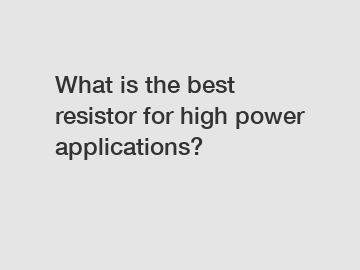What is the best resistor for high power applications?
What is the best resistor for high power applications?
In high power applications, choosing the right resistor is crucial to ensure optimal performance, reliability, and safety. With various types of resistors available, each having its own strengths and limitations, selecting the best one can be a challenging task. So, let's delve into the world of resistors for high power applications and explore the factors one should consider before making a decision.
1. Power Rating: The power rating of a resistor is perhaps the most critical parameter to consider. It determines the amount of heat the resistor can dissipate without getting damaged. High power applications generate significant amounts of heat, so it is essential to choose a resistor with a suitable power rating to handle this heat without compromising its functionality.

2. Resistance Value: The resistance value determines the amount of current that the resistor allows to flow through it. In high power applications, the resistance value should be carefully selected to ensure that the current passing through the resistor is within its safe operating limits. Choosing a resistor with too low resistance may lead to excessive current flow, causing overheating and potentially damaging other components.
3. Thermal Management: Efficient thermal management is crucial in high power applications to prevent excessive heat buildup, as excessive temperatures can degrade the resistor's performance or even lead to failure. Consider resistors with enhanced thermal conductivity, such as power resistors with aluminum heat sinks or ceramic-housed resistors that provide better heat dissipation, thus ensuring reliability in high power scenarios.
4. Voltage Rating: Voltage rating is another essential aspect to consider, as it determines the maximum voltage that the resistor can withstand without insulation breakdown. High power applications may involve high voltages, so selecting a resistor with a suitable voltage rating is vital to avoid any potential hazards or reduced performance due to voltage stress.
5. Construction Type: Various different resistor technologies exist, each with its own advantages and limitations. Some common types include wire-wound resistors, metal oxide film resistors, and thick film resistors. Wire-wound resistors are well-suited for high power applications due to their robust construction and high-temperature capabilities. Metal oxide film resistors offer good stability and reliability, while thick film resistors provide cost-effective solutions for high power scenarios.
6. Tolerance and Stability: Tolerance refers to the allowable deviation from its specified resistance value, while stability reflects the resistor's ability to maintain its value over time and under different operating conditions. In high power applications, resistors with tight tolerance and excellent stability are preferred to ensure accurate and consistent performance.
7. Environmental Considerations: Depending on the application's environment, resistors may be exposed to factors like moisture, dust, or extreme temperatures. Choosing resistors with appropriate environmental ratings and protective coatings can ensure long-term reliability even in harsh conditions.
In conclusion, selecting the best resistor for high power applications requires careful consideration of several factors. The power rating, resistance value, thermal management capabilities, voltage rating, construction type, tolerance and stability, and environmental suitability all contribute to making an informed choice. By evaluating these points and understanding the specific requirements of the application, one can identify the perfect resistor that balances performance, reliability, and safety.
So, when it comes to high power applications, always remember to ask yourself: What is the best resistor for high power applications?
If you want to learn more, please visit our website resistor manufacturing factory, resistor manufacturing factory, chip resistor manufacturer.

Comments
0